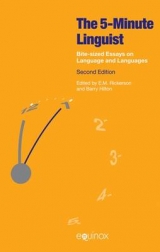
The Five-Minute Linguist
Equinox Publishing Ltd (Verlag)
978-1-84553-199-7 (ISBN)
- Titel erscheint in neuer Auflage
- Artikel merken
Language is a vital part of everybody's life, and nearly everybody is interested in knowing more about it. It's all too easy for people to lose interest, though, when the answers to their questions turn out to be long and technically challenging. "The Five-Minute Linguist: Bite-sized Essays on Language and Languages" takes a new approach to making accurate and up-to-date knowledge about language accessible in a non-academic way. It consists of 60 short chapters adapted from the weekly scripts of a popular U.S. public radio series on language. The scripts, contributed by a cross-section of leading professional linguists in America and abroad, address popular questions like "How many languages are there in the world?" "Is elementary school too early to teach foreign languages?" and "How good is machine translation?" They are written with a light touch that has been highly successful in reaching an audience of intelligent non-specialists. The book preserves that light touch while adding such features as an index (to help readers connect topics touched on in more than one chapter) and suggestions for follow-up reading.
E. M. Rickerson has a Ph.D from the University of California at Berkeley and is Director Emeritus of the award-winning language program at the College of Charleston (S.C.). Formerly a language program director in the U.S. government, he now consults on the development and improvement of language programs at the university level. In 2005 Dr. Rickerson created a radio series on languages ("Talkin' About Talk"), which was broadcast on public and college radio stations -- and on which The Five-Minute Linguist was based Barry Hilton is a freelance writer/editor and independent scholar living in Maine. He was a member of the editorial board that reviewed the radio scripts on which The Five-Minute Linguist was based. He has travelled and lived in both Europe and Asia, making professional use of Vietnamese, Chinese, Japanese, French, and German in a variety of jobs. He describes himself as an "armchair philologist and recovering polyglot."
Foreword Bret Lovejoy Introduction E.M. Rickerson and Barry Hilton 1. Why Learn about Language? Robert Rodman 2. How Many Languages are there in the World? M. Paul Lewis 3. What's the Difference between Dialects and Languages? G. Tucker Childs 4. What was the Original Language Barry Hilton 5. Do All Languages Come from the Same Source? Allan Bomhard 6. What Language Did Adam and Eve Speak? E.M. Rickerson 7. Why do Languages Change? John McWhorter 8. Is Pidgin English Just Bad English? John Lipski 9. How Many Kinds of Writing Systems are there? Peter Daniels 10. Where did Writing Come From? Peter Daniels 11. Where Does Grammar Come From? Joan Bybee 12. Do All Languages have the Same Grammar? Mark Baker 13. How do Babies Learn their Mother Tongue? Roberta Michnick Golinkoff and Kathryn Hirsch-Pasek 14. Do Animals Use Language? Donna Jo Napoli 15. How does the Brain Cope with Multiple Languages? Henk Haarmann 16. Does our Language Influence The Way We Think? Geoffrey Pullum 17. What's the Right Way to Put Words Together? Dennis Preston 18. Is British English the Best English? Orin Hargraves 19. Why do People Fight over Language? Paul Garrett 20. What does it Mean to be Bilingual? Dora Johnson 21. What is 'Speaking in Tongues'? Walt Wolfram 22. What happens if you are Raised without Language? Susan Curtiss 23. Do Deaf People Everywhere use the Same Sign Language? Leila Monaghan 24. Why do Languages Die? Christopher Moseley 25. Can a Threatened Language be Saved? Akira Yamamoto, et al. 26. Why do American Southerners Talk that Way? Walt Wolfram 27. What Causes Foreign Accents? Steven Weinberger 28. How are the Sounds of Language Made? Peter Ladefoged 29. Can Monolingualism be Cured? Katherine Sprang 30. What does it Take to Learn a Language Well? Nina Garrett 31. Do we Think Differently Today about Language Learning? June Phillips 32. Why Study Languages Abroad? Sheri Spaine Long 33. Is Elementary School too Early to Teach Foreign Languages? Gladys Lipton 34. Can Computers Teach Languages Faster and Better? Frank Borchardt 35. What's the Language of the United States? David Goldberg 36. Is there a Language Crisis in the U.S.? Catherine Ingold 37. Is Spanish Taking over the U.S.? MariaCcarreira 38. What is Cajun and where did it Come from? Robyn Holman 39. Did German Almost Become the Language of the U.S.? Nancy Nenno 40. What's Gullah? Elizabeth Martinez-Gibson 41. Are Dialects Dying? Walt Wolfram 42. Can you make a Living Loving Languages? Frank R. Jackson 43. How are Dictionaries Made? Erin McKean 44. Why do we Need Translators if we have Dictionaries? Kevin Hendzel 45. How Good is Machine Translation? David Savignac 46. Can you use Language to Solve Crimes? Robert Rodman 47. How can you Keep Languages in a Museum? Amelia Murdoch 48. Where did English come from? John Algeo 49. How many Native American Languages are there? Marianne Mithun 50. Is Latin Really Dead? Frank Morris 51. Who Speaks Italian? Dennis Looney 52. How Different are Portuguese and Spanish? Ana Carvalho 53. Should we be Studying Russian? Benjamin Rifkin 54. What's Exciting about Icelandic? Pardee Lowe 55. Do all Arabs Speak the Same Language? Jerry Lampe 56. Is Swahili the Language of Africa? Donald Osborn 57. Do you have to be a Masochist to Study Chinese? Barry Hilton 58. Is Studying Japanese Worth the Effort? Blaine Erickson 59. What ever Happened to Esperanto? E.M. Rickerson 60. Does Anybody here Speak Klingon? Christopher Moseley
| Erscheint lt. Verlag | 1.9.2006 |
|---|---|
| Zusatzinfo | Illustrations |
| Verlagsort | London |
| Sprache | englisch |
| Maße | 156 x 234 mm |
| Themenwelt | Geisteswissenschaften ► Philosophie ► Sprachphilosophie |
| ISBN-10 | 1-84553-199-X / 184553199X |
| ISBN-13 | 978-1-84553-199-7 / 9781845531997 |
| Zustand | Neuware |
| Haben Sie eine Frage zum Produkt? |
aus dem Bereich



